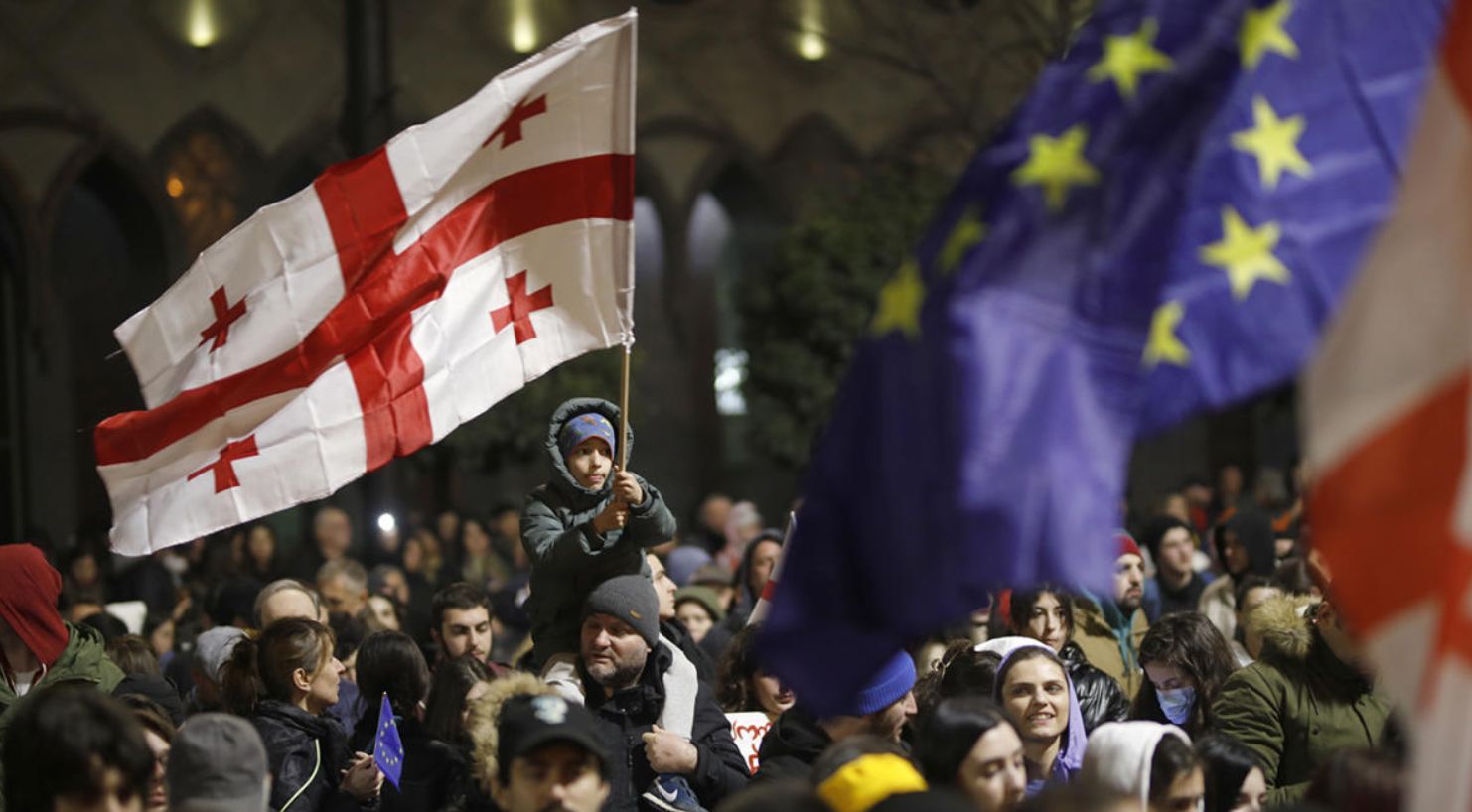South Ossetia and Abkhazia are territories within Georgia that declared independence from Georgia and have been acting in a de facto independent capacity since the early 1990s. No member state of the UN has recognized the independence of the two territories so far.
On August 8, 2008, Georgia alleged that South Ossetia separatists had attacked some villages and broken a ceasefire. South Ossetia denied these allegations. Georgia launched a military offensive to surround and capture Tskhinvali, the capital of South Ossetia.
Russian military troops entered the war on the side of South Ossetia and won the conflict. Georgia took the case to the International Court of Justice (Georgia versus Russia; Hague court application, 2008).
Eight days later, on August 16, 2008, the fighting between Russian & Georgian troops came to an end. Russian/South Ossetian/Abkhazian emerged victorious.
Nicaragua and the Russian Federation recognized South Ossetia and Abkhazia as independent republics. However, most ethnic Georgians from former South Ossetia AO and the Kodori Gorge had to leave their homes and migrate to Georgia.
Just as Ukrainians are resisting Russia’s invasion, Georgian protesters fear growing Russian influence in their country. Georgia is torn between resistance and continued fighting within the country for European integration and democracy.
On March 23, 2023, the United States Institute of Peace issued a statement that analyzed the tabling of two bills regarding ‘foreign agents’ sponsored by the pro-Russian faction in Georgia.
The masses of the people rejected it on the plea that if the bills were passed, it would prove a roadblock in Georgia coming closer to the EU and could also be detrimental to the development of a democratic system of Georgia.
Four hundred Georgian human rights groups, research organizations, and media outlets released a joint statement denouncing the so-called “Russian law” as an attack on Georgia’s civil society and people.
The protesters and others who opposed the two draft bills included students, young people, women, journalists, professionals, artists, and groups representing issues ranging from disability rights to entrepreneurship. Protesters signaled their enduring fight against Russian influence by waving flags not just for their country but for the EU and Ukraine.
Georgia–Italy Relation
These two countries established formal diplomatic relations in May 1992. Georgia has an embassy in Rome. Italy has an embassy in Tbilisi. Both countries are full members of the Council of Europe.
During the 2008 South Ossetia war, the Italian Minister of Foreign Affairs Franco Frattini said, “We cannot create an anti-Russia coalition in Europe, and on this point, we are close to Putin’s position.” He had stressed that the then Italian Prime Minister, Silvio Berlusconi, a close ally of Prime Minister Vladimir Putin, should talk to him on the Georgian issue.
On 8 August, the Italian Government issued a statement reporting that “In close coordination with its European Union and Atlantic partners, the Italian Government is following the crisis that has developed in South Ossetia with grave concern” and that “Italy calls on all parties to bring an immediate end to the violence and reach a lasting cessation of hostilities. It strongly encourages a resumption of negotiations for a political solution to the problem with due respect for Georgia’s sovereignty and territorial integrity”.
Later, on 10 August, after contacts with the US Secretary of State, the French Foreign Minister, and the Finnish Minister for Foreign Affairs, the Italian Minister of Foreign Affairs reiterated this invitation.
In an 11 August interview with the La Stampa newspaper, the Italian Foreign Ministry reported about the direct involvement of Silvio Berlusconi, Prime Minister of Italy: “Sarkozy phoned Putin in his capacity as current President of the European Union, and 10 minutes later he phoned Berlusconi. ‘Silvio, you speak to Vladimir too,’ he said, ‘explain that we’re not anti-Russian and we all want Moscow to be close to the EU.’
In his conversation with Berlusconi, Putin reiterated his position that Russia had every right to intervene in Georgia”, and referred to an eventual deployment of Italian troops. Bilateral relations between the two countries cover important fields like politics and strategies, tourism, defense, trade, education and culture, and agriculture and forestry.
Immigration Of Georgians
Agenda.GE, the Georgian newspaper, in its edition of 16 February 2024, quoted Italian President Sergio Mattarella saying that Georgia’s bid for European membership was “absolutely logical” given the country’s belonging to European civilization. He firmly pointed out that Italy supported the aspirations of the people of Georgia.
Though some senior US officials have visited Tbilisi, the capital of Georgia (Gorjistan to Arab and Farsi historians and travelers), a streak of uncertainty is palpable in the psyche of ordinary Georgians which has stimulated the urge to immigrate to European countries, especially to Italy because of all the European countries, it is Italy which has demonstrated sympathy with the people of Georgian in their hour of stress and pain.
Some reasons for the large-scale immigration of Georgians to Italy (and also other European countries) have been told. Though Georgian immigrants may move to different European countries, their attraction to Italy is essentially because Italy has understood their problems with compassion.
According to the Migrants & Refugees Section, the main reason Georgian immigrants leave their country is economic. Other reasons include studying or family reunification.
Some Other Reasons For Immigration To Italy Includes:
- Ease of entry
- Italy’s increasing prosperity
- The segmentation of the Italian labor market
- Push factors from the countries of origin
- The demographic collapse in Italy
Migrants from this country in the Caucasus essentially fall into three categories: ethnic minorities returning to their countries of origin, migrants in search of better socioeconomic conditions, and refugees from war, conflict, political unrest, and corruption. The main destination countries for Georgian migrants are Russia, Ukraine, the US, and European countries.
Kutaisi International Airport is the cheapest exit from Georgia by air and the main escape hatch for the citizens of an emptying nation. Situated a four-hour train ride away from the capital, Tbilisi, and two hours from the second-largest city, Batumi, the airport is a microcosm of the socioeconomic situation in the country.
Driven out of their homes by persistent poverty, growing prices, and pessimism about the future, Georgians flock to Kutaisi to catch flights on Wizz Air, a Hungarian low-costar, and head for the greener pastures of the European Union.
According to Georgia’s official statistics, cities are the main point of departure for the majority of migrants, most of whom are young, highly skilled individuals in the 20-34 age groups.
Some are overqualified for the work they are employed to do in the destination countries, but they still earn enough to support their families back home, thereby contributing to regional stability. The much-lamented brain drain – the outflow of human capital – thus helps to provide livelihood security.
Many of the Georgian labor migrants head to Italy to pick up menial jobs. The official number of Georgians in Italy stood at almost 30,000 last year, which was a 27.6 percent increase compared to the previous year, according to Italy’s National Institute for Statistics.
Increasing numbers of young Georgians are opting to study abroad. The out-migration of this age group also impacts the country’s demographic structure. Many of these migrants start their own families while living abroad, resulting in a population decline in Georgia.
The number of Georgian migrants living in Germany in 2020 is estimated at 27,315. According to recent figures from the National Statistics Office of Georgia (2020), Germany is the most important destination country for Georgian education migrants.
Foreign remittances made up 16 percent of Georgia’s $24.6 billion GDP in 2022, though this exceptionally high rate was partly caused by the inflow of Russians, who escaped military mobilization or other consequences of their country’s invasion of Ukraine and found shelter in Georgia.

Conclusion
Owing to poverty, fear of Russian interference, good education, and working habits, immigration from Georgia – a Caucasian country – to European countries and particularly to Italy is spiraling fast.
Overall, population depletion is a problem that Georgia will have to reckon with. Foreign remittances greatly help Georgia, but at the same time, the state will have to develop a strong mechanism of self-reliance. These and other issues are almost common to most of the Caucasus states.
Foreign remittances made up 16 percent of Georgia’s $24.6 billion GDP in 2022, though this exceptionally high rate was partly caused by the inflow of Russians, who escaped military mobilization or other consequences of their country’s invasion of Ukraine and found shelter in Georgia.
- OPED By KN Pandita
- Prof. Pandita (Padma Shri) is the former Director of the Center of Central Asian Studies at Kashmir University. Views personal of the author.




